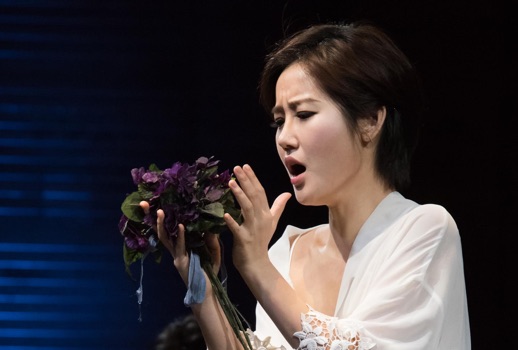
Even in Milan in 1831, the story made its points by contrasting the lives of unsophisticated countryfolk to the sophisticated types who attended urban opera houses. But Bellini’s score is so full of delights that singers still yearn to display themselves in it, and we who love bel canto wish to hear them do it.
A semi-staged concert presentation is a happy compromise, and the happy collaboration of the Met’s Lindemann Young Artists with the Juilliard School, now in its sixth season, proves a likely occasion. It opened last night and plays again Thursday and Saturday; you’d be well advised to catch it.
The youthful cast were astonishingly mature for this subtle work, providing plentiful evidence for the programs they have taken part in. They all sing Italian well, the vocal lines flowing and their ornamentation distinctive but not excessive.
The voices sang with an evenness from top to bottom admirably suitable to the period, and few inappropriate but necessary breaths in what should be a seamless line. If I mention the defects of each voice, it is not because they were glaring but because they were rare—not grave faults but areas where polish might be helpful.
Clarissa Lyons sang the thankless role of Lisa with applauded agility, a slight scoopiness and an interesting acid tone—suitable for the character but also properly distinct from Amina’s more radiant soprano. She is also capable of letting it out; in the Act I finale, she drowned out everyone else on stage. Perhaps she has a different fach in her future.
Sava Vemic, whose suave bass has been attracting admiration around town, performed Count Rodolfo with authority and a witty touch of back-patting vanity. As he launched “Vi raviso,” the only familiar number in the opera that does not feature the soprano, there was a sense of happy settling in among the voice-fanciers in the audience who know the number from so many Golden Age recordings, and we were all pleased with the smoothness of his reverie. A bit of vocal huskiness towards the end might almost have been nostalgia welling up in the gentleman’s throat, and perhaps explains why his lovely cabaletta was not repeated.
Kang Wang sang Elvino with a clarion tenor, evenly produced from top to bottom—Rubini probably used a lot of head voice, but the ut de poitrine had not been invented yet. He does not use this ringing tenor very subtly, and one did not feel the pain of the betrayed lover; soft singing is not evidently among his gifts; but for those who like a clear sound and admirable technique, he was impressive and pleasurable. Verdi rather than the elegiac Bellini seems the likeliest direction for him.
Heysang Park made her American debut a year ago courtesy of the Juilliard program as the witty Fiorilla in Il Turco in Italia. Amina is quite a different matter. She must sing a great deal, displaying sincerity without much variation, and it would be easy to overdo, with intricacy, the feelings of this simple girl who is, by turns, happy, happier, asleep but happy, miserable, asleep and miserable, and at last ecstatic. Park has a coolly beautiful voice, tasteful restraint with ornament, an attractive trill, an impressive F in alt to conclude the opera, and a gently convincing stage personality.
Her singing rang out clearly and flowed over Bellini’s endless lines graciously. The one flaw was that she sometimes seemed to miscalculate a run of coloratura, rushing to fit them in before the next phrase, but this gave the endearing impression—intentional or not—that Amina was carried giddily out of step by her own emotions. The imprecision suited the part and the story.
Sara Couden’s sizable mezzo and Thesele Kemane’s buffo cutting-up were rather wasted on the tiny roles of Lisa and Alessio. A small but expert chorus sounded about five times as many voices as they actually were in the Peter Jay Sharp Theater.
Speranaza Scappucci, who also led Rossini’s Turco last year, conducted a sprightly performance if sometimes lacking in fireworks in order to support the needs of the singers. Bellini blossomed over us like a love fest.
Photo credit: Nan Melville


